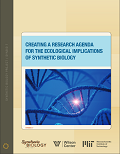Publications

June 1, 2014
Creating a Research Agenda for the Ecological Implications of Synthetic Biology
Environmental scientists and synthetic biologists have for the first time developed a set of key research areas to study the potential ecological impacts of synthetic biology, a field that could push beyond incremental changes to create organisms that transcend common evolutionary pathways. The Synthetic Biology Project at the Wilson Center and the Program on Emerging Technologies at the Massachusetts Institute of Technology convened the interdisciplinary group of scientists and are releasing the report, Creating a Research Agenda for the Ecological Implications of Synthetic Biology. The work was funded by a grant from the National Science Foundation.
The report prioritizes key research areas for government agencies, academia and industry to fund. Research areas include species for comparative research; phenotypic characterization; fitness, genome stability and lateral gene transfer; control of organismal traits; monitoring and surveillance; modeling and standardization of methods and data. The report says it is necessary to establish and sustain interdisciplinary research groups in order to conduct the research. Long-term support is also needed to address complex questions about how synthetic biology could impact the environment and overcome communication barriers across disciplines, the report says.
